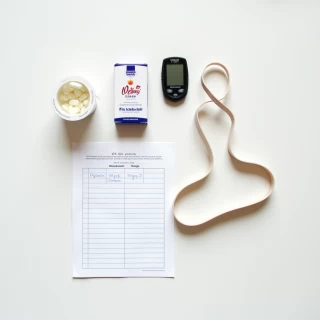
- 25th September 2025
Table of Contents
- Understanding Type 2 Diabetes
- The Pillars of Diabetes Management
- Dietary Management: Fueling Your Body Wisely
- Physical Activity: Moving Towards Better Health
- Medication and Monitoring: When Lifestyle Isn't Enough
- Lifestyle Adjustments for Long-Term Success
- Weight Management: A Key Factor
- Stress Management: Taming the Silent Factor
- Adequate Sleep: Rest for Better Regulation
- Regular Check-ups and Screenings
- Empowering Your Journey
Mastering Type 2 Diabetes: A Comprehensive Guide for Adults
Living with type 2 diabetes can feel overwhelming, but with the right knowledge and strategies, it's entirely possible to manage your condition effectively and lead a healthy, fulfilling life. This guide will walk you through the key aspects of managing type 2 diabetes, from understanding the basics to implementing practical lifestyle changes.
Understanding Type 2 Diabetes
Type 2 diabetes is a chronic condition where your body either doesn't produce enough insulin or doesn't use insulin effectively. Insulin is a hormone that regulates the movement of sugar (glucose) into your cells for energy. When this process is disrupted, glucose builds up in your bloodstream, leading to high blood sugar levels. Over time, uncontrolled high blood sugar can lead to serious health complications, including heart disease, kidney disease, nerve damage, and vision problems.
Risk Factors and Diagnosis
Several factors can increase your risk of developing type 2 diabetes, including genetics, age, obesity, physical inactivity, and certain ethnic backgrounds. Diagnosis typically involves blood tests such as the glycated haemoglobin (HbA1c) test, which measures your average blood sugar levels over the past 2-3 months, and fasting plasma glucose tests.
The Pillars of Diabetes Management
Effective management of type 2 diabetes revolves around a combination of lifestyle modifications, medication, and regular monitoring. Dr. Pankaj Kumar, a General Physician specializing in diabetes and lifestyle medicine, emphasizes a holistic approach to care. You can book a consultation with Dr. Kumar for personalized guidance.
Dietary Management: Fueling Your Body Wisely
What you eat plays a crucial role in managing your blood sugar levels. The goal is not to eliminate carbohydrates entirely but to choose wisely. Focus on complex carbohydrates, lean proteins, and healthy fats. Incorporate plenty of non-starchy vegetables, fruits, and whole grains. Limiting processed foods, sugary drinks, and excessive saturated and trans fats is essential. A balanced diet can significantly improve your blood sugar control and overall well-being. For more detailed dietary advice, explore our article on healthy eating for diabetics.
Physical Activity: Moving Towards Better Health
Regular physical activity is a powerful tool in diabetes management. Exercise helps your body use insulin more efficiently and can lower blood sugar levels. Aim for at least 150 minutes of moderate-intensity aerobic activity per week, along with two or more days of muscle-strengthening exercises. Activities like brisk walking, swimming, cycling, and dancing are excellent choices. Before starting any new exercise regimen, especially if you have existing health conditions, it's advisable to consult with a healthcare professional.
Medication and Monitoring: When Lifestyle Isn't Enough
While lifestyle changes are fundamental, many individuals with type 2 diabetes will also require medication to achieve their target blood sugar levels. These may include oral medications that help your body produce more insulin, improve insulin sensitivity, or reduce glucose production by the liver. Some individuals may also require insulin injections. Regular monitoring of your blood glucose levels, as advised by your doctor, is vital to understand how your body responds to treatment and to make necessary adjustments. Dr. Pankaj Kumar provides comprehensive care, and you can learn more about his approach to diabetes management on Dr Pankaj Kumar on Practo.
Lifestyle Adjustments for Long-Term Success
Beyond diet and exercise, several other lifestyle factors contribute to effective diabetes management.
Weight Management: A Key Factor
If you are overweight or obese, losing even a modest amount of weight can have a significant impact on your blood sugar control and reduce your risk of complications. Weight loss can improve insulin sensitivity and often allows for a reduction in diabetes medications. Consider exploring a structured Lifestyle Modification Program to support your weight management journey.
Stress Management: Taming the Silent Factor
Stress can elevate blood sugar levels by triggering the release of hormones that counteract insulin. Finding healthy ways to manage stress, such as mindfulness, meditation, yoga, or spending time in nature, is crucial. Prioritizing self-care can make a big difference.
Adequate Sleep: Rest for Better Regulation
Poor sleep can affect your metabolism and insulin sensitivity, making blood sugar control more challenging. Aim for 7-9 hours of quality sleep per night. Establishing a consistent sleep schedule and creating a relaxing bedtime routine can help improve your sleep quality.
Regular Check-ups and Screenings
Regular visits to your healthcare team, including your general physician, endocrinologist, ophthalmologist, and podiatrist, are essential. These check-ups help monitor your condition, screen for potential complications, and adjust your treatment plan as needed. Staying informed and proactive about your health is key to preventing long-term issues.
Empowering Your Journey
Managing type 2 diabetes is a continuous journey, but you don't have to navigate it alone. With the right support from healthcare professionals like Dr. Pankaj Kumar, and a commitment to healthy lifestyle choices, you can effectively control your blood sugar, minimize complications, and live a vibrant life. Take the first step by exploring resources on Diet Plus Minus and empowering yourself with knowledge.
Take-Home Messages:
- Type 2 diabetes management relies on a balanced diet, regular exercise, and appropriate medication.
- Weight loss significantly improves blood sugar control and insulin sensitivity.
- Stress and sleep quality profoundly impact blood sugar levels; prioritize self-care.
- Regular medical check-ups and screenings are vital for preventing complications.
- Empower yourself with knowledge and work closely with your healthcare team for optimal health.
References:
- American Diabetes Association. (2023). Standards of Medical Care in Diabetes-2023. Diabetes Care, 46(Supplement 1), S1-S291.
- Evert, A. B., et al. (2019). Nutrition Therapy for Adults With Diabetes or Prediabetes: A Consensus Report. Diabetes Care, 42(5), 731-754.
- Colberg, S. R., et al. (2016). Exercise and Type 2 Diabetes: The American College of Sports Medicine and the American Diabetes Association Consensus Statement. Diabetes Care, 39(11), 2065-2079.
- Taylor, R. (2019). Type 2 Diabetes Remission and Relapse: An Update. Journal of Internal Medicine, 286(6), 619-629.
- Kyrou, I., et al. (2018). Stress, A Major Risk Factor for Cardiovascular Disease. Hormones (Athens), 17(Suppl 1), 28-36.
- Reutrakul, S., & Van Cauter, E. (2018). Sleep and Diabetes: A Bidirectional Relationship. Endocrine Reviews, 39(4), 529-546.














